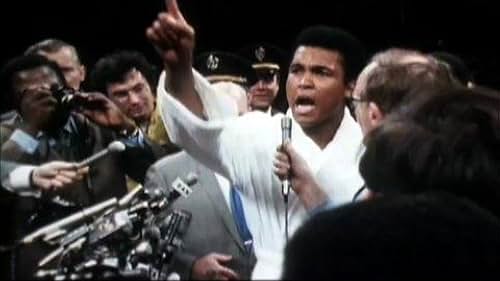“I done wrestled with an alligator. That’s right. I have wrestled with an alligator. I done tussled with a whale. I done handcuffed lightning, thrown thunder in jail. That’s bad! Only last week I murdered a rock, injured a stone, hospitalised a brick! I’m so mean I make medicine sick! Bad, fast! Fast! Fast! Last night I cut the light off in my bedroom, hit the switch and was in the bed before the room was dark.” – Muhammad Ali, When We Were Kings.
1974’s “Rumble in the Jungle” boxing match between George Foreman and Muhammad Ali in Zaire (present day Democratic Republic of the Congo) has gone down as one of the greatest spectacles in the history of sport. Like the fighters themselves, the event has transcended boxing and simply exists in the collective cultural knowledge of the west, as if it were always there. Zaire was the place to be in October of ’74, and the man to watch was the 31-year-old Muhammad Ali. Leon Gast’s 1996 documentary When We Were Kings is better than a time capsule; it’s a portal through time, set to pull the viewer fifty years into the past the instant Ali appears on screen.
When We Were Kings is the only documentary I’ve watched more than once – in fact, I’ve seen it three or four times. Perhaps that says something about a subconscious prejudice I have for the artform but I like to think of it as praise for Gast’s masterpiece. The first time I watched it, I wasn’t more than twelve, and it was unlike anything I’d ever seen. The film is electric. The editing has an energy that I’ve yet to see matched; the soundtrack – including songs from The Spinners, B.B King, and James Brown – is incredible; the modern narration from Spike Lee, Norman Mailer, and George Plimpton is insightful and unintrusive. They let the film speak for itself, mostly, and it’s all the better for it.
It is Muhammad Ali himself, though, who is the true star. Ali, who still received scrutiny for his stance as a conscientious objector. Ali, who was said to be well out of his prime with 7:1 odds against him in the fight. Ali, who may have been the greatest entertainer who never made a career in acting. If there’s one thing this film is most remembered for, it’s certainly Ali’s ability to hold a room in the palm of his hand. So powerful was his gift of the gab that the archival footage will transfix an audience fifty years later. His crack back to sports journalist Howard Cosell,
“You’re always talking about, “Muhammad, you’re not the same man you were 10 years ago.” Well, I asked your wife, and she told me you’re not the same man you was two years ago!”
and braggadocious statements months, weeks and days before the fight,
“I’m young, I’m handsome, I’m fast, I’m pretty and can’t possibly be beat.”
“People do say I’m cocky. Some say I need a good whoopin’. Some say I talk too much. But, anything that I say I’m willing to back up.”
are some of the most entertaining moments you could hope for in any movie. There was a charisma to Muhammad Ali that made it impossible to look away from him. An articulate, witty, boxing machine whose contribution of popular culture today cannot be ignored.
This film is about so much more than boxing, it’s an incredibly personal story, especially for Ali who takes every moment he can to call out the beauty of Africa and injustices toward the black population of America. Ali agreed to the fight taking place in Africa as a bit of retribution against the American press who continued to hound him for refusing to fight in Vietnam. Gast emphasises this from the very first lines.
“Yeah, I’m from Africa. Yeah, Africa’s my home. Damn America and what America thinks. Yeah, I live in America; but, Africa’s the home of the black man. And I was a slave 400 years ago and I’m going back home to fight among my brothers.”
Perhaps unfairly, When We Were Kings posits the late George Foreman as a real villain. Gast makes continued reference to Foreman’s controversial arrival in Africa with his two German Shepherds and the breed’s ties to colonial oppression. This leads to a particularly humorous moment when the local Zaireians become confused that Foreman was not white. Despite this slant against Foreman in some elements of the story, the documentary is not shy about emphasising his power, noting the watermelon-sized dent he would leave in the heavy bag after 15 minutes. I’m sure Foreman wasn’t too upset when he joined the crew and helped Ali, stricken with Parkinson’s Disease, onto the stage at the Academy Awards when the film won Best Documentary Feature in 1997.
So strong was the pro-Ali sentiment in Zaire his training in the weeks leading to the fight was underscored by a local chant, ‘Ali bomaye’: Ali, kill him. And that’s what the champ intended to do when the day of the fight rolled around. When Gast’s When We Were Kings reaches that moment of the fight, there’s a feeling no other film can provide. A truly ethereal sense where all the threads laid down in the hour beforehand converge to become a perfect cinematic experience. You’d struggle to find a more inspiring or entertaining way to spend ninety minutes. And I can’t wait to watch it again
“Me, We.” – Muhammad Ali, 1975 when asked to say a poem while giving a speech at Harvard.




